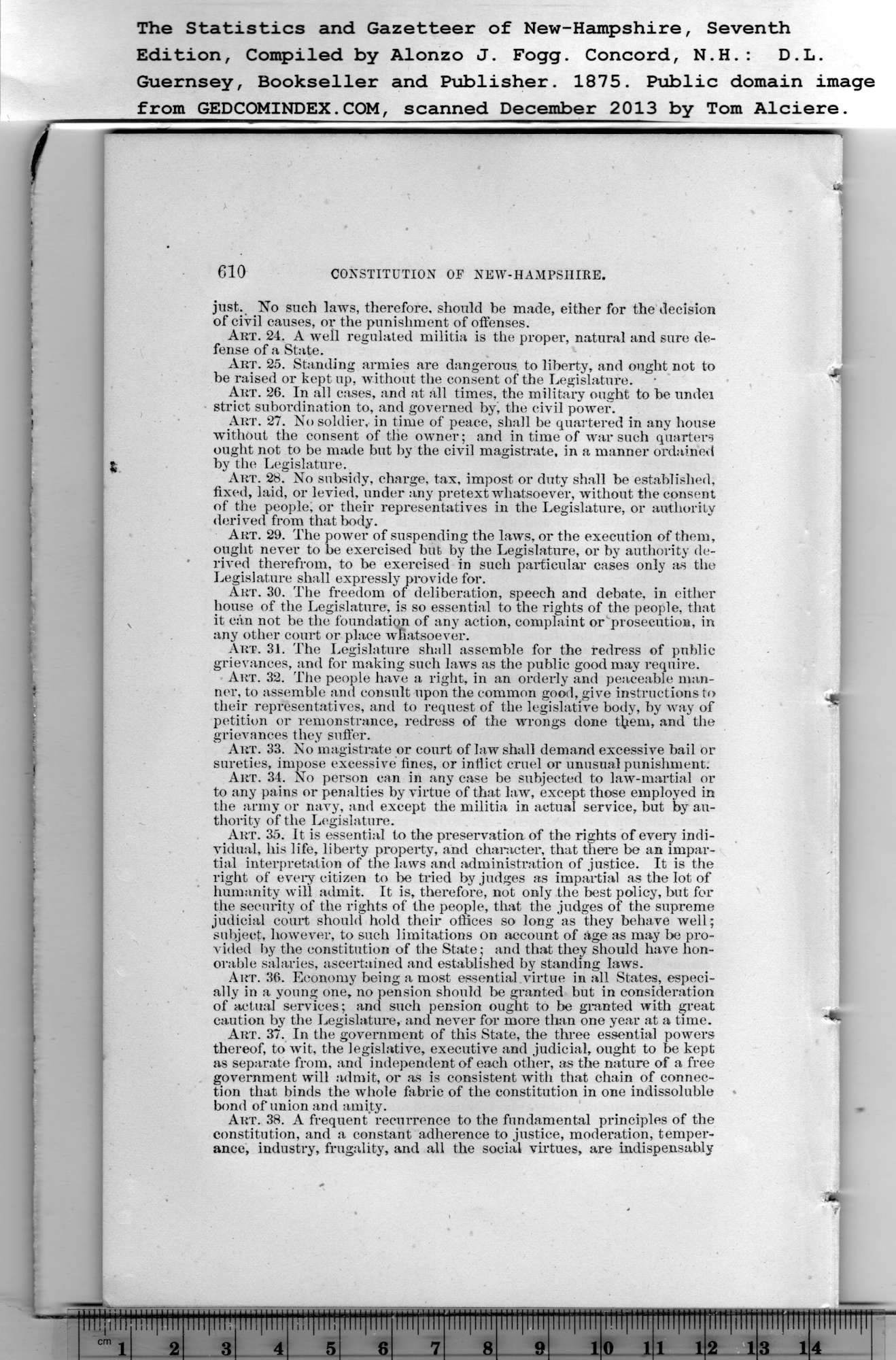|
610
CONSTITUTION OF NEW-HAMPSIIIRE.
just. No such laws, therefore, should be made, either for the decision
of civil causes, or the punishment of offenses.
Art. 24. A well regulated militia is the proper, natural and sure de-
fense of a State.
Art. 25. Standing armies are dangerous to liberty, and ought not to
be raised or kept up, without the consent of the Legislature.
Art. 26. In all cases, and at all times, the military ought to he undei
strict subordination to, and governed by, the civil power.
Art. 27. No soldier, in time of peace, shall be quartered in any house
without the consent of the owner; and in time of war such quarters
ought not to be made but by the civil magistrate, in a manner ordained
by the Legislature.
Art. 28. No subsidy, charge, tax, impost or duty shall he established,
fixed, laid, or levied, under any pretext whatsoever, without the consent
of the people, or their representatives in the Legislature, or authority
derived from that body.
Art. 29. The power of suspending the laws, or the execution of them,
ought never to be exercised but by the Legislature, or by authority de-
rived therefrom, to be exercised in such particular cases only as the
Legislature shall expressly provide for.
Art. 30. The freedom of deliberation, speech and debate, in either
house of the Legislature, is so essential to the rights of the people, that
it can not be the foundation of any action, complaint or prosecution, in
any other court or place whatsoever.
Art. 31. The Legislature shall assemble for the redress of public
grievances, and for making such laws as the public good may require.
Art. 32. The people have a right, in an orderly and peaceable man-
ner, to assemble and consult upon the common good, give instructions to
their representatives, and to request of the legislative body, by way of
petition or remonstrance, redress of the wrongs done tflem, and the
grievances they suffer.
Art. 33. No magistrate or court of law shall demand excessive hail or
sureties, impose excessive fines, or inflict cruel or unusual punishment.
Art. 34. No person can in any case be subjected to law-martial or
to any pains or penalties by virtue of that law, except those employed in
the army or navy, and except the militia in actual service, but by au-
thority of the Legislature.
Art. 35. It is essential to the preservation of the rights of every indi-
vidual, his life, liberty property, and character, that there be an impar-
tial interpretation of the laws and administration of justice. It is the
right of every citizen to be tried by judges as impartial as the lot of
humanity will admit. It is, therefore, not only the best policy, but for
the security of the rights of the people, that the judges of the supreme
judicial court should hold their offices so long as they behave well;
subject, however, to such limitations on account of age as may be pro-
vided by the constitution of the State; and that they should have hon-
orable salaries, ascertained and established by standing laws.
Art. 36. Economy being a most essential virtue in all States, especi-
ally in a young one, no pension should be granted but in consideration
of actual services; and such pension ought to be granted with great
caution by the Legislature, and never for more than one year at a time.
Art. 37. In the government of this State, the three essential powers
thereof, to wit, the legislative, executive and judicial, ought to be kept
as separate from, and independent of each other, as the nature of a free
government will .admit, or as is consistent with that chain of connec-
tion that binds the whole fabric of the constitution in one indissoluble
bond of union and amity.
Art. 38. A frequent recurrence to the fundamental principles of the
constitution, and a constant adhex*ence to justice, moderation, temper-
ance, industry, frugality, and all the social virtues, are indispensably
ffipppi
PREVIOUS PAGE ... NEXT PAGE
This page was written in HTML using a program written in Python 3.2
|
